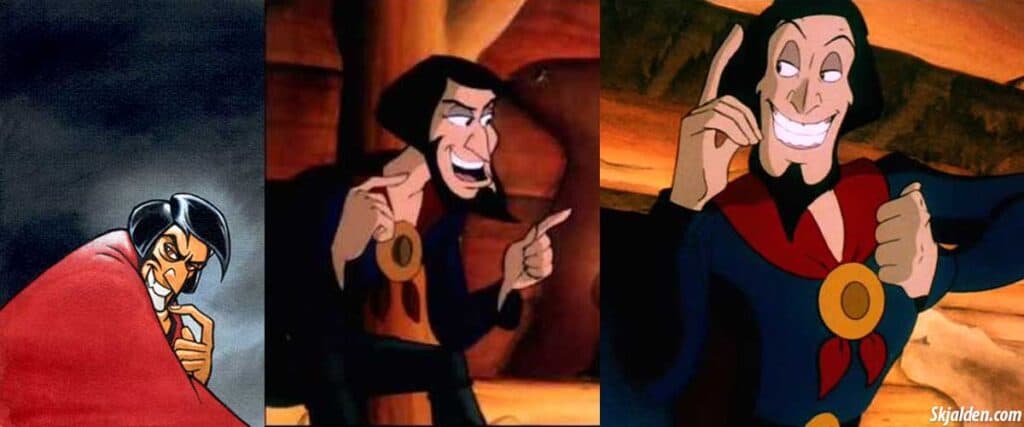Loki is by some, called the god of mischief, but is that really true, and is he even a god according to the Old Norse sagas? We know that the Aesir sees him as one of their own, even though he is half jötunn (a giant) and half Aesir.
We also know that Loki is the son of Farbauti and Laufey, who presumably lives in Jotunheim, his father is a jötunn, and his mother is an ásynja, but not much else is known about them, besides the meaning of their names. Farbauti can be translated into, dangerous/cruel striker, and Laufey is best known by her nickname Nál which means needle.
It is in þulur, which is a listing of names in the appendix of the Prose Edda, that Laufey is listed as an ásynja (a female goddess). This means that Loki’s association with the Aesir, is, therefore, on his mother’s side, which is very unusual.
That is because it is typically a male Aesir who has a child with a jötunn and not the other way around. This probably led him to take the surname of his mother “Laufeyjarson” instead of his father. This was most likely something Loki chose to do because his mother has a higher status due to the fact, that she is a goddess.
So, yes, Loki does have Asgardian blood running through his veins, and he is related to them on his mother’s side, but, because the family lineage is traditionally passed down through the male line, he can, and should probably be seen as being lesser than the rest of the Aesir.
Loki also has two brothers, Helblinde and Býleistr, who presumably also are the sons of Farbauti and Laufey, but this is not mentioned. We actually do not know much about Loki’s family tree or his background, which is a bit strange, when we think of how often he has a lead role in one of the sagas.
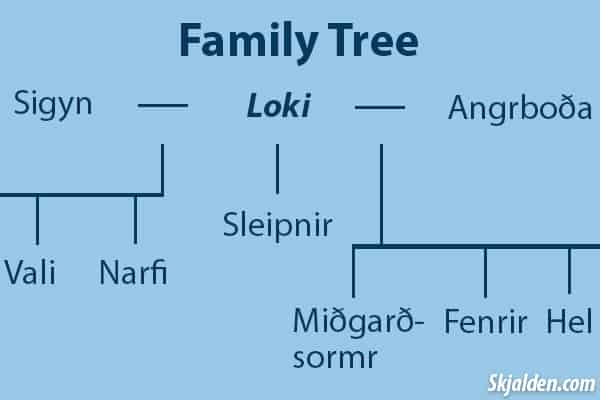
Loki is married to Sigyn, and together they have the sons Vali and Narfi. Sigyn is an extremely loyal wife, and no matter what happens to her husband, she will never leave his side.
Loki also has three horrible children together with the jötunn, Angrboda. The names of these children are, Jörmungandr, a huge worm that lives in the ocean, the big and terrifying wolf, Fenrir, and Hel, who became the queen of the underworld.
Loki is not evil, nor is he good, and he lived in Asgard even though he is from Jotunheim (the land of the giants). If there is something Loki loves to do, then it is to make a lot of trouble for anyone and everyone especially, for the Gods and Goddesses. He just wants to be entertained, even if it is for just a short amount of time, no matter what the consequences are.
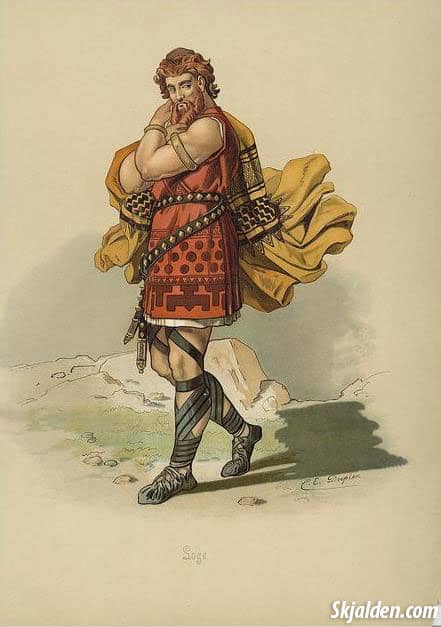
Loki has been described as a strange alluring frightening figure, who is unreliable, moody, teasingly, and a cunning trickster, but also intelligent and sly. He has mastered the art of shapeshifting, some sort of magic (Old Norse: seiðr), which gives him the ability to shapeshift into anything, and, yes, I mean into any living creature he wants.
Loki has been depicted by many artists for centuries, and in recent times mostly by movies from marvel studios, i.e. Avengers: Infinity War (2018) Avengers: Endgame (2019) where he was played by the actor Tom Hiddleston. The New York Times bestseller “Loki: Where Mischief Lies” has similar characteristics as the marvel series.
My favorite depiction of Loki is the drawings by Peter Madsen, this could probably be from personal biases because my favorite cartoon in my childhood was Valhalla from 1986.
Peter Madsen is in my opinion a genius, he has managed to capture the essence of the whole character. That smirk smile on his face, with those deceiving eyes, is exactly how I imagined Loki when I was reading the sagas.
The meaning of Loki’s name
Many scholars have argued that the name Loki means knot or tangle, and his trickster figure has certainly been compared to the conception of a spider that creates a web out of nothing. For instance, when Loki ran away from Asgard, to avoid being punished for causing Baldur’s death. He hid in a house on top of a hill that had four doors, one pointing north, south, west, and east. At day he turned himself into a salmon and swam in the lake below, and at night he sat at the fire weaving a fishing net so he could catch some fish to eat.
He managed to hide here for a while, but Odin would eventually spot his hiding place, and just as Loki was caught in his own web of lies in the past, so was finally caught in his own fishing net in the lake by the Aesir.
Some authors have tried to translate his name into “Logi” which means flame in Old Norse, but there does not seem to be anything that associates him with fire.
Another name that has been used about him is “Lopt”, which can be translated into “air”, this could probably be a reference to him as being able to disappear into thin air. However, the author Snorri Sturluson did not elaborate on why he was mentioned by this name in one of the sagas.
Loki and Sleipnir
In most of the sagas, Loki is just referred to by his name, but in the saga of how the walls around Asgard were built, he is referred to as Loki Laufeyjarson. This saga is kinda odd, he shapeshifts himself into a mare so he can get the stallion Svadilfari (Old Norse: Svaðilfari) to impregnate him.
This was a desperate attempt to get himself out of trouble, by delaying the builder in finishing the wall around Asgard before the agreed-upon time. If the builder had managed to build the wall, then he would have gotten the goddess Freya, the sun, and the moon in payment for his work. Because of this interference, some people think that Loki should be praised for this act, but he was actually the very reason in the first place that the builder was making such a great process.
Loki is a deceiver, a liar, and if you were able to take a closer look at his tongue, it might as well look like a snake. He can never be trusted, he will lie to your face, and then stab you in the back.
His pregnancy with Svadilfari resulted in him giving birth to the eight-legged horse Sleipnir. This horse has been described as being the fastest of all the horses, and this horse would eventually become Odin’s steed.
Is Loki a god?
According to the sagas, Loki is half jötunn, half Aesir, and could possibly be an ancient “god”, I put this in quotation marks, because he might be a being who is on a journey to become a god, but he is not referred to as one, in any of the Old Norse sources. He could possibly be referred to as a half-god, due to his blood relation on his mother’s side.
Of course, there’s that short stanza that people like to bring up, as a convincing argument, that is supposed to pull his status in the direction of being a god.
Do you remember, Odin, when in bygone days we mixed our blood together? You said you would never drink ale unless it were brought to both of us. – Lokasenna
The context is often omitted, but it has to be read as part of the whole, to understand why it was said.
The stanza can be found in the poem Lokasenna, which can be translated into “Loki’s truth-telling”. In this poem we see another of Loki’s disgusting character traits come to light.
All of the Aesir, Vanir, and Elves were invited to Aegir’s (Ægir) hall for a great feast.
Loki had traveled a long way because he wanted to use the opportunity to taste Aegir’s famous mead. Outside the hall, he met Eldir, one of Aegir’s servants, there was also another servant named Fimafeng, but he was killed by Loki out of jealousy because he could not stand to hear how the gods praised him.
Loki demanded that the servant told him what the gods were talking about in the hall, and Eldir replied, they talk about weapons and the art of war.
Before entering the hall, Loki looked at the servant and said, I will mix their mead with malice, and before the feast is over, the gods will fight among themselves.
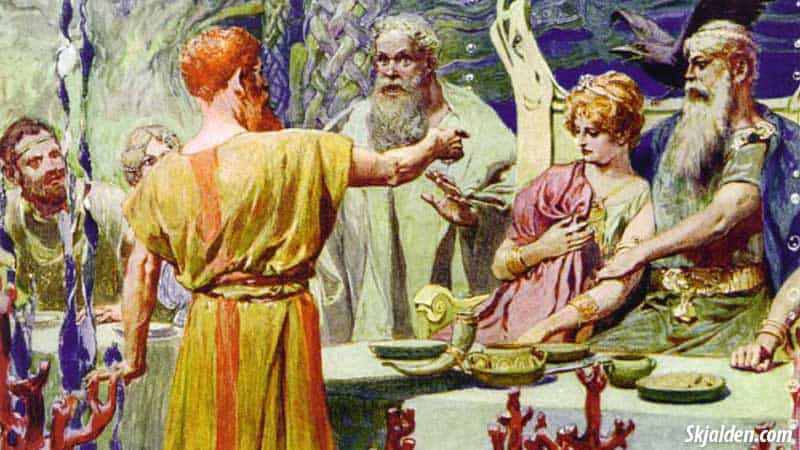
This feast was, of course, supposed to be a fun evening with lots of mead, but Loki was as usual up to something and had other plans in mind. Once inside, the hall turned silent, and like a clear night sky full of stars, hundreds of eyes were looking at him.
Loki broke the silence and said, I am thirsty, and I have come a long way to try Aegir’s famous mead. Nobody answered him, so he started to insult and call the gods arrogant for not answering him, followed by the demand to be seated at one of the tables.
Bragi who is the god of poetry was the first one to respond and told him that he is not welcome at the feast, we know who to invite, and who not to invite. Loki completely ignored him and instead tried to fill Odin’s ears with sweet words of nothingness, reminding him that they once mixed their blood together.
Odin then appointed him a seat next to his son Vidar, who then poured a cup of mead for Loki. He raised his cup and brought out a toast to everyone at the feast, except for Bragi.
The feast continued on, and the insults just kept coming out of Loki’s foul mouth, not only did he insult the host, he then continued by bad-mouthing the guests or simply just told them to keep their mouth shut.
At the end of the saga, Thor arrives at the Ægir’s hall, after he had been away slaying jötnar in Jötunheim. He threatens Loki to stop his actions, which Loki eventually does because he knows that Thor will not leave it at threats. But before Loki leaves the hall, he turns his head and tells Aegir (Ægir) that this will be his last feast because his hall will be burned to the ground.
In The Lay of Reginn (Reginsmál) Loki brings the gods into trouble when he kills the son of Hreidmar, who was in the shape of an otter. This resulted in the gods being held hostage until Loki returned back with enough gold to fill the inside of the otterskin and cover the outside with red gold. Red gold could be another word that was used for amber.
Another example of Loki’s deceiving character is in the saga of Utgard-Loki (Old Norse: Útgarða-Loki). In this saga, Loki and Thor stopped at a farm in Midgard to sleep for the night. Thor was as he so often is, very hungry, but the poor farmer had little to offer him, so Thor decided to kill his two goats, Tanngrisnir and Tanngnjóstr. They were all allowed to eat, but on the condition, that they don’t break any of the bones, and that all of the bones had to be thrown onto the goatskin.
During dinner, Loki convinced the boy Thjalfi (Old Norse: Þjálfi) to break one of the bones and suck some of the sweet marrow out of it. The next day, when Thor revived his two goats again, he notices that one of them was limping. This resulted in Thjalfi and his sister Röskva becoming the servants of Thor as payment. But Loki could not care less, this was yesterday’s entertainment, and today was a new day.
In The Lay of Thrym (þrymskviða) it does show that Loki is not just about being evil, hence what I said about not being neither good nor evil. The poem begins with Thor waking up and noticing that his hammer Mjölnir is missing. Thor tells this to Loki before they both walk down to Freya so they borrow her cloak made of falcon feathers.
Loki puts on the cloak and flies to Jotunheim, in the search of the hammer. At his arrival, he hears the jotünn named Thrym who is sitting on a mound bragging about what he has done, and that if Thor wants his hammer back, then he wants Freya as his wife. After hearing this, Loki turns back to Asgard.
Freya was confronted with the dilemma, but she refused to be part of it and said I will under no circumstances go to Jotunheim. Just the thought of it made her so angry, that she trembled her feet so hard that her necklace Brisingamen fell on the ground.
The gods then held a meeting so they could decide what to do, and it was here that the god Heimdall suggested that, instead of bringing Freya, Thor could just dress as the bride himself.
But Thor immediately rejected the idea, but, Loki reminded him that if he did not get his hammer back, he would be powerless if the jötnar decided to invade Asgard.
After a while, Thor finally agreed to be dressed up as a beautiful bride, and Loki even offered to come along as his maid. At their arrival in Jötunheim, they were greeted by Thrym who was very excited and demanded that his servants spread some straw out on the benches for his coming wife.
In the evening, at dinner, Thor ate an entire ox, and eight salmon while drinking three kegs of mead. This made Thrym suspicious, but Loki assures him that everything is fine, and said, Freya, has not eaten for eight long nights because she was yearning to meet you.
Moments later, Thrym lifted the veil so he could kiss his coming bride, but he was shocked when he saw two terrifying eyes staring back at him, seemingly burning with fire. But again, Loki was quick with a remark, and said, she has not slept for eight nights in eagerness to see you.
A few moments later, one of the servants came into the hall with Mjölnir, so they could use it in the ceremony. But when Thor saw the hammer he quickly grabbed it and killed all of the jötnar in the hall.
As you can see from this short summary of the saga, Loki does help sometimes, but did he do it because he wanted to be nice, or was he just bored and wanted something to do.
But Loki did not really make things easy for himself, he increasingly became more annoying, deceiving, and dangerous to have around for the Aesir. His involvement in Baldur’s death was the final straw, and he was finally rewarded with a punishment worse than death.
He was dragged into a cave, where he was tied to a rock with the intestines of his own brothers. Before they left him to his fate, the Aesir placed a venomous snake above his head, this snake would drip poison onto his face day and night. But his loyal wife Sigyn chose to stay next to him so she could hold a bowl above his head and catch as much poison as possible, but each time she empties the bowl, some of the poison drips onto his face, which makes him scream and shake violently in pain.
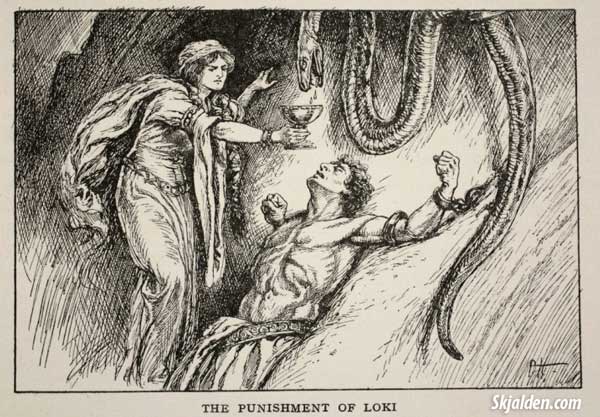
At Ragnarök, Loki will finally be able to break free from his chains and flee to Muspelheim, where he will help gather the army of the dead and sail to Vigrid in the ship Naglfari to fight against the gods and goddesses in one last great epic battle.
In the poem Völuspá, it is foretold by a Völva that Loki will face the god Heimdall during the battle and they will fight each other till their death.
In conclusion, is Loki the god of mischief?, no, he is not the god of anything according to the Old Norse sagas. However, he can be considered a half-god, since his mother Layfey is an ásynja (female Aesir).
Another thing that disproves Loki being a god is that there is no evidence that he has been worshipped by anyone in Scandinavia. There are no names, farms, places, towns, or anything else that could be considered a form of a holy place or an honorable mention named after him.
And, no, Saturday is not Loki’s day, the name in Old Norse for Saturday is “Laugardagr”, which literally means bathing day. There is nothing, in any source, that connects Loki and this day, or any other day of the week.
Sources:

